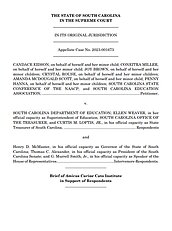Learn more about Cato’s Amicus Briefs Program.
In spring 2023, Governor Henry McMaster of South Carolina signed a law establishing an Education Scholarship Trust Fund Program (Program). The law provides eligible low- and moderate-income families with a trust fund account, up to $6,000 per eligible student, per school year. Parents can direct funds towards a variety of education-related expenses, including after-school tutoring, special needs accommodations, and tuition and fees associated with transferring between public schools or attending a private and independent school.
It’s this latter, “school choice,” aspect of the law that has prompted a legal challenge. In October 2023, before the initial trust fund accounts could be created and used by parents, a collection of parents, the state chapter of the NAACP, and a state teachers’ union petitioned the Supreme Court of South Carolina to prevent the Program’s implementation. They allege the Program violates the state Constitution on several grounds, including that the state-funded Program lacks a “public purpose” and, thus, violates Article X, section 5. On December 12, 2023, the Court agreed to hear the case.
Cato has filed an amicus brief in support of the Program. Our brief highlights that the Program has several “public purposes” that would benefit South Carolina and its residents.
First, the Program is created to increase students’ and public schools’ academic performance. Providing new funds to parents to supplement their child’s education with after-school or weekend classes, test prep, or tutors amounts to a self-evident public purpose that tends to improve students’ academic performance. Further, the controversial school choice aspect of the program also has a public purpose. The Program allows some low- and moderate-income parents who are unhappy with their assigned public school to transfer their child to a new public or independent school. Empirical research highlighted by EdChoice and others shows that programs like this provide accountability to assigned public schools and have a positive effect on public school operations or students’ academic performance.
Second, our brief argues that the Program would reduce conflict about education policy. Americans’ preferences about education policy vary greatly. Many South Carolina parents are deeply unhappy with the curriculum, funding, homework, or disciplinary policies at their assigned public school. This results in parent resentment, school board fights, and occasional litigation. Cato’s Neal McCluskey and others have highlighted how school choice programs reduce social friction by allowing parents to transfer their children to public and independent schools that do not undermine the parents’ educational and civic values.
Lastly, our brief argues the Program would reduce sectarian conflict about education policy. Many South Carolina parents are religious, and there is an undeniable parental appetite for religious instruction and prayer in public and independent schools, where children spend most of their waking hours. However, public schools are constitutionally prohibited from providing religious instruction. The Program has a “release-valve” effect because it enables religious minorities to hire like-minded tutors, enroll their child at a religious independent school, or transfer their child to a public school that parents believe will not undermine the religious teaching their children receive at home. The Program, therefore, should reduce sectarian conflict over education policy and improve parental satisfaction with their school.
For these reasons, our brief urges that the South Carolina Supreme Court find the Education Scholarship Trust Fund Program confers a public benefit to South Carolina and its residents that is consistent with the state Constitution.

This work is licensed under a Creative Commons Attribution-NonCommercial-ShareAlike 4.0 International License.


